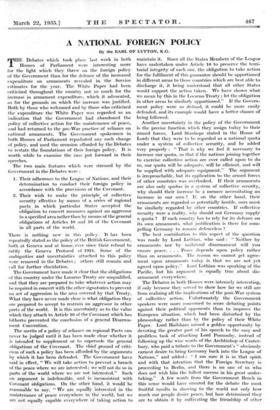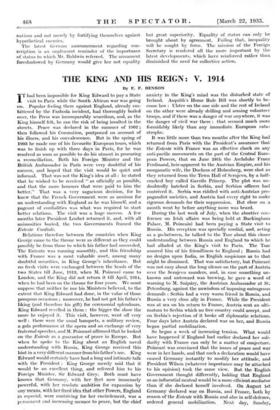A NATIONAL FOREIGN POLICY By the EARL OF LYTTON, E.G.
THEDebates which took place last week in both Houses of Parliament were interesting more for the light which they threw on the foreign policy of the Government than for the defence of the increased expenditure on armaments revealed in the Service estimates for the year. The White Paper had been criticized throughout the country not so much for the increase in armament expenditure, which it advocated, as for the grounds on which the increase was justified. Both by those who welcomed and by those Who criticized the expenditure the White Paper was regarded as an indication that the Government had abandoned the policy of collective action for the maintenance of peace, and had returned to the pre-War practice of reliance on national armaments. The Government spokesmen in both Houses of Parliament repudiated any such change of policy, and used the occasion afforded by the Debates to restate the foundations of their foreign policy. It is worth while to examine the case put forward in their speeches.
The two main features which were stressed by the Government in the Debates were : 1. Their adherence to the League of Nations, and their determination to conduct their foreign policy in accordance with the provisions of the Covenant.
2. Their wish to make the principle, of collective security effective by means of . a series of regional pacts_ in which particular States accepted the obligation to concert measures against an aggressor in a specified area rather than by means of the general obligations of Articles 10 and 16 of the Covenant in all parts of the world.
There is nothing new in this policy. It has been repeatedly stated as the policy of the British Government, both at Geneva and at home, ever since their refusal to ratify the Geneva Protocol of 1924: Some of the ambiguities and uncertainties attached to this policy were removed in the Debates ; others still remain and call for further elucidation.
The Government have made it clear that the obligations of this country under the Locarno Treaty are unqualified, and that they are-prepared to take whatever action may be required in concert with the other signatories to prevent an act of aggression in the area covered by that Treaty. What they have never made clear is what obligation they are prepared to accept to restrain an aggressor in other parts of the world. It is this uncertainty as to the value which they attach to Article 10 of the Covenant which has hitherto prevented the conclusion of a general Disarma- ment Convention.
The merits of a policy of reliance on regional Pacts can never be judged until it has been made clear whether it is intended to supplement or to supersede the general obligations of the Covenant.. The chief ground of criti- cism-of such a policy has been afforded by the arguments by which -it. has been defended. The Government have said in effect, " We will take action to prevent a breach of the peace where we are interested ; we will not do so in parts of the world where we are not interested." Such an argument is indefensible; and Is inconsistent with Covenant obligations. On the other hand, it Would be reasonable to say, " We are equally interested in the maintenance of peace everywhere in the world, but we are not equally capable everywhere of taking action to maintain it. Since all the States Members of the League have undertaken under Article 10 to preserve the terri- torial integrity of each one, the 'obligation to take action for the fulfilment of this guarantee should be apportioned in different areas to those countries which are best able to discharge it, it being understood that all other States would support the action taken. We have shown what we mean by this in the Locarno Treaty ; let the obligation in other areas be similarly apportioned." If the Govern- ment policy were so defined, it could be more easily defended, and its example would have a better chance of being followed: Another uncertainty in the policy of the Government is the precise function which they assign today to their armed forces.' Lord Stanhope stated in the House of Lords that they were to be regarded as a national quota under a system of collective security, and he added very properly : " That is why we feel it necessary to increase our quota, so that if the nations joining together to exercise collective action are ever called upon to do so, our quota will be adequate, will be efficient, and will be supplied with adequate equipment." The argument is irreproachable, but its application to the armed forces of other countries was overlooked. If their armaments are also only quotas in a system of collective security, why should their increase be a menace necessitating an increase in our own ? If, on the other hand, their armaments are regarded as potentially hostile, ours must be similarly regarded by other countries. If collective security were a reality, why should not Germany supply a quota ? If each country has to rely for its defence on its own armaments, what justification is there for com- pelling Germany to remain defenceless ?
The best contribution to this aspect of the qUestion was made by Lord Lothian, who said : " Neither by armaments nor by unilateral disarmament will you ensure peace. . . . Peace depends upon policy rather than on armaments. The reason we cannot get agree- ment upon armaments today is that we are not yet agreed upon policy." Lord Lothian was speaking of the Pacific, but his argument is equally true about dis- armament. everywhere.
The Debates in both Houses were intensely interesting, if only because they served to show how far we still are from realizing all the implications of the post-War system of collective action. Unfortunately the Government speakers were more concerned to score debating points against their political opponents than to improve the European situation, which had been disturbed by the Phraseology rather than by the policy of their White Paper. Lord Hailsham missed a golden opportunity by devoting the greater part of his speech to the easy and profitless task of attacking Lord Ponsonby, instead of following up the wise words of the Archbishop of Canter- bury, who paid a tribute to the Government's " obviously earnest desire to bring Germany back into the League of Nations," and added : " I am sure it is in that spirit and with that intention that the Foreign Secretary is proceeding to Berlin, and there is no. one of us who does not wish him the fullest success- in his great under- taking." A few words from the Government Bench in this sense would- have ensured for the debdte the most fruitful milks in showing to the world not only how Much our people desire peace, but how determined they are to obtain it by cultivating the friendship of other nations and not merely by fortifying themselves against hypothetical enemies.
The latest German announcement regarding con- scription is an unpleasant reminder of the importance of status to which Mr. Baldwin referred. The armament foreshadowed by Germany would give her not equality but great superiority. Equality of status can' only be brought about by agreement. Failing that, inequality will be sought by force. The mission of the Foreign Secretary is rendered all the more important by the latest developments, which have reinforced rather than diminished the need for collective action.





























































 Previous page
Previous page